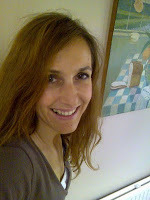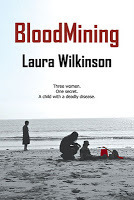Guest interview with Laura Wilkinson
 Laura Wilkinson will be known to many of you as one of the brains behind hagsharlotsheroines, the website which showcased and promoted the work of many female novelists. But she's also a writer herself, and her powerful debut BloodMining was recently published and is available now. I picked Laura's brains about genealogy, the plague and visions of the future...
Laura Wilkinson will be known to many of you as one of the brains behind hagsharlotsheroines, the website which showcased and promoted the work of many female novelists. But she's also a writer herself, and her powerful debut BloodMining was recently published and is available now. I picked Laura's brains about genealogy, the plague and visions of the future...FLB: BloodMining is set in the near future. Perhaps inevitably given that I also work with time periods other than our current one, I'm particularly interested in the worldbuilding element, so how did you approach the task of constructing Elizabeth's section of the story (which is - scarily, once you've read the book! - just a handful of years ahead as I write these words), and Megan's which is the next generation on? The technology, I noticed, is a recognisable but more advanced version of our own (I'm picturing a mulmed as something resembling a cross between a tablet and a smartphone; and I was amused to note mention of laws restricting paper use, so perhaps it's fitting that I read the book on an e-reader, as I assume most people in Megan's time would!); but how did you go about determining the state of world events and how they would affect the characters and plot?
LW: The finished, published story is not told chronologically, but I did, in fact, write Elizabeth's section first. Given that this projects only a few years into the future I didn't feel the need to build a vastly different alternative world. After the cataclysmic event of 2015, on an emotional level things have altered beyond recognition for many people, while the external world remains much the same in many respects. There are no destroyed buildings or vegetation as there would be after war or environmental catastrophe for example. But of course, a world with far fewer people, especially the young and the old, would feel very different, leaving aside the ransacked shops, empty schools and care homes. I looked at footage of villages and towns deserted or abandoned because of conflict or famine, and the film I am Legend was great for inspiration too. This kind of loss, followed by such uncertainty, and quiet, would affect characters deeply – Elizabeth is crushed initially, whereas Hannah demonstrates great resilience (and selfishness) in the way that she bounces back. And this imagined disaster allows unaffected nations and unscrupulous people to profit from others' tragedies, and bury pretty despicable actions for many, many years, the aftershocks of which reverberate for generations.
For Megan's sections, which project further into the future I determined the state of my world by preying on our current anxieties. So: Christian Muslim relations are fragile, with the West's dominance much reduced; China is the undisputed super power with scant regard for environmental protection laws; a nanny state is omnipresent with 'population protection laws' controlling how much alcohol people can consume legally and so forth. Megan and Jack are friends, in part, because they rebel against such controls, because they believe in the pursuit of truth. And, I hope, there are some positives in this future world. The environment is treated with more respect for example and people are more co-operative, even if it is forced upon them by poverty!
FLB: Genealogy and the complexities of family relationships are necessarily explored as Megan examines her line of descent in the name of finding a compatible donor to save her son Cerdic, who is born with a terminal and inherited illness. In the 'DVD extras' at the back of the book, you discuss your own experiences with your genes and background. Megan and Cerdic's story is an example of one of the positives that can come from researching one's genealogy - what, in your view, is the flipside to this? How could researching one's family tree - adopted, donor or not - go wrong? How could Megan's attempts have backfired?
LW: The flipside? Good question, I've not considered this till now. Finding out one of your parents is a mass murderer? Adopted, donor or biological I imagine this would be devastating news. Meeting one's biological parents/parent might be a source of disappointment (leaving aside killers for a while)… you might find you have little if anything in common, that you share vastly different and opposing values. In BloodMining Megan never discovers for certain whether or not Owen is her biological father. She does learn he was a pretty unsavoury character, however. If she found out for sure I wonder what she would have made of this? How would it have made her feel? Another possible outcome is one that is explored a little in the book itself, and I don't want to say too much in case there are readers who have not read it yet.
 FLB: You use recognisable names for your characters, which I rather liked (super-futuristic sci-fi names can be quite offputting, I find), but of course trends in given names do change. Was it a conscious effort to stick with names your readers would be familiar with?
FLB: You use recognisable names for your characters, which I rather liked (super-futuristic sci-fi names can be quite offputting, I find), but of course trends in given names do change. Was it a conscious effort to stick with names your readers would be familiar with?LW: Yes, because like you I find super-futuristic names off-putting; I didn't set out to write sci-fi (and don't view the novel that way myself) – serious names for serious literature says it neatly, if not one hundred per cent accurately (Ursula Le Guin, anyone?) – and all the leading characters' names, with the exception of Cerdic, which is an ancient Welsh name, are traditional and, I hope, timeless. My grandmother's generation used them, and generations before them; we hear them today, and I believe we'll hear them in the future.
FLB: In Elizabeth's time, 2015 brings a disastrous wave of plague to Britain, wiping out swathes of the population including Elizabeth's husband and sons. You strongly echo the original bubonic plague in this section of the story: 2015's plague is spread by rats (after infected lab animals escape, or possibly are released by terrorists), and the state of Elizabeth's husband's body when she finds him certainly resembles that of a bubonic plague victim. Bodies are collected by government officials in vans (shades of 'bring out your dead!'); and I noted that the authorities evidently hadn't learned from past experiences as they set about slaughtering all animals, including predators like dogs and cats, to deal with an illness that has rats as its main vectors! Completely believable from politicians, but did you have any particular intent in your choice of the method by which Britain's population was to be cut so drastically; in having history repeat itself rather than a more 'modern' disaster?
LW: As you know, I am fascinated by history, and the lessons that can be learned from it, but I'm not convinced that we do always learn from our mistakes. History does have a nasty habit of repeating itself and turning round and biting us on the backside when our attentions are turned elsewhere. During my research into present day diseases and viruses I was surprised to discover that the plague (various forms of it, not just the bubonic) is still very much with us, and it became clear to me that this was the disaster I'd been searching for. And rats are potent 'baddies', at least for most people. I suspect you might take a different view, Faye! It resonated nicely with the loss of children, the allusion to the story of the Pied Piper of Hamelin and so forth. As you'll have gathered I write my first draft and then research, rather than the other way round.
FLB: You're a mother yourself, and maternal love is a lynchpin of the book. If this question isn't too morbid, how did you find the experience of plotting and creating such a disastrous fictional future which, if real, would have affected the future your own sons face?
LW: Honestly? I never for one moment imagined my little lads living in that particular future. I might be hopelessly optimistic, but I sincerely hope that we will work through many of the issues that could lead to some of the worse aspects of my fictional future. However, I am also a realist and I recognise that the challenges we face today with regards to things like biological warfare, the development of super viruses and challenges around the building of a solid ethical framework for reproductive technology are enormous and we won't get it all right all of the time. And I don't believe it's all bad in my imagined future either. For example, we do need to seriously address the sustainability of our planet's resources and population control is one aspect of this. Of course, I'm not for one moment wishing for anything as devastating as the events I create in BloodMining, but some good does come out of the bad, and it seems to me that this is true of most things in life. I did bring my own experience of motherhood to the characters and I hope this lends an emotional truth. As a mother of two healthy boys I am very aware of how lucky I am, so it wasn't easy to write those sections of the novel when children's lives are threatened. As a writer you become your leading character(s) and so you experience their emotional journey, good and bad.
Thanks Laura! BloodMining is published by Bridge House Publishing and is available in paperback and Kindle format. For more about Laura and her book, visit her website at laura-wilkinson.co.uk.
Published on November 28, 2011 20:09
No comments have been added yet.
Faye L. Booth's Blog
- Faye L. Booth's profile
- 10 followers
Faye L. Booth isn't a Goodreads Author
(yet),
but they
do have a blog,
so here are some recent posts imported from
their feed.



